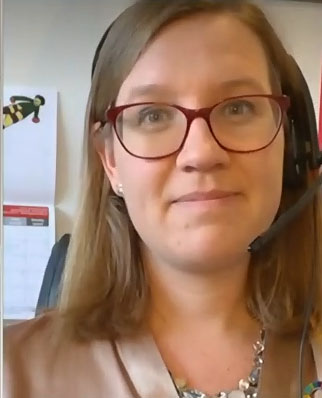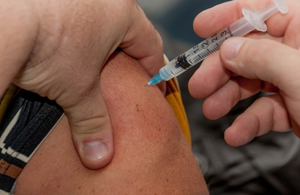
Wednesday February 3, 2021 | NATIONAL [Updated at 6:11 pm PST]
Editorial Analysis by Mary P Brooke, B.Sc., Editor | Island Social Trends
With COVID vaccine supply being top of mind for most Canadians, today NDP Leader Jagmeet Singh said the federal government has failed to have an effective plan, to procure enough doses, and to adequately administer the vaccine to Canadians.
There was a brief pause between the arrival of the pandemic in the spring of 2020 and by all accounts (scientific, public health and the lesson of history) the expected arrival of a second wave in the fall. It appears that while other countries (notably the UK in Europe) rolled up their sleeves immediately to build vaccine production facilities in their own country, Canada chose at first to shop globally for products that were known to be under development.
That was a smart move — from the perspective of taking advantage of supply that was very likely to become available in the short term. But even if it was due to pandemic-shock or ‘COVID-fatigue’, it appears the government then rested on its laurels to some degree, taking pride in the cleverness of their first move on the proverbial chess board.
But other countries saw the mid-to-long-term from the start. Not just now in this pandemic but also beforehand, in a long period of decades in which Canada let its domestic production of vaccines slide into insufficiency or near-non-existence.
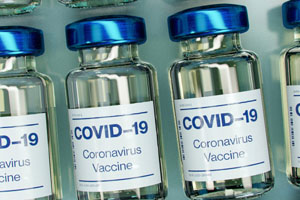
This week the federal government has announced production facilities being built or made ready in Montreal and Vancouver (privately owned, but with significant funding support from government). Whether this was in the works from early-on in the pandemic (spring 2020) to build domestic production capacity is truly unclear.
The public face of the government’s ‘taking care of Canadians’ was the procurement of vaccines from existing facilities. Whether there was a hard push to also secure licencing contracts with non-Canadian pharmaceutical companies to produce vaccines here is also unclear — maybe Canada tried and failed, or maybe they didn’t take that route at all.
To date, available vaccines have been administered to residents and workers in long-term care and front-line hospital workers. As has been articulated by BC’s Provincial Health Officer, it’s a matter of first vaccinating those who are at most risk for severe illness and death. Few will argue the importance of that as a first step (even though there is a counter-argument that the young-adult workforce should be protected first, given the long-term impact of this pandemic on people’s health, the workforce and economy for decades now to come).
Why ‘global shopping’ over domestic capacity:
Speaking at a press conference in Ottawa this morning (10 am Pacific Time), NDP Leader Jagmeet Singh says the federal government “did not prioritize vaccines”, even though it was clearly evident that vaccines would be ‘the way out’ of the pandemic, he told media.
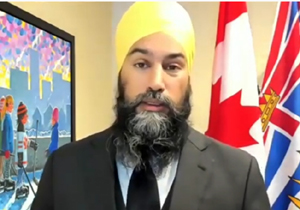
It does seem evident that the Liberal government chose to use its strong financial resources to shop early for vaccines beyond Canada’s borders from companies that were ready with vaccine technologies (both the science and the production capacity).
Indeed, Prime Minister Justin Trudeau and federal Public Services and Procurement Minister Anita Anand have expressed pride in having one of the best strategies for options and opportunities to purchase vaccines as they became real (i.e. proven to work against COVID infection) and became available (i.e. manufactured in quantity).
Back in November 2020, Trudeau admitted back that “we used to have [production capacity] decades ago but we no longer have it.” Canada had taken its eye off the ball. That is not only unfortunate and serious from a public safety point of view but it also speaks to a lack of respect for Canada’s powerful leadership in developing vaccines (notably the polio vaccine developed by virologist Jonas Salk in Toronto in 1955, where the vaccine was produced for years and sold internationally).
Later this afternoon Minister of International Development Karina Gould came right out (in an interview on CTV Power Play) with a statement that domestic production is critical. So perhaps now the momentum is underway.
But to be hearing this messaging from the International Development minister at this juncture still shows the global mindset as possibly still leading the way over the confidence and muster required for at-home development. It’s human nature to protect one’s own resources and home base; somehow that still seems lacking in the Canadian approach, if only that it comes as a second thought, not first.
And it may well be that Trudeau knows his country well — that the Canadian investor class would likely require some time to warm up to the idea of risking their capital in pharmaceutical production facilities after about 30 years of that industrial capacity falling apart in Canada due to the lure of greater profit to be made in other ventures.
COVID heroes & the power of goodwill:
Every war has its heroes. The frontline workers in health-care are number one on that list, as well as frontline workers in essential service industries that keep food on our tables, gas in our vehicles, and a range of personal services in communities. The young adult generation (ages 18 to 39 years) are also paying the price, seeing their futures sacrificed on the altars of short-to-midterm social immobility and long-term economic crisis.
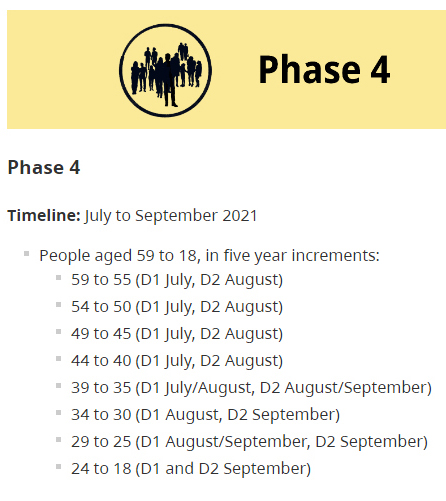
But the next round of heroes will be those of sturdy financial resource being willing to take a risk on building Canada’s domestic vaccine production capacity. That means for this pandemic (which appears it will continue for years both in terms of achieving herd immunity and economic recovery) and future pandemics (which by the nature of vaccines are likely and expected).
Due to Canada’s slow start out of the gate with domestic supply production, Canadians can only hope that goodwill for Canada is held high in Europe and the United States in particular, as it’s those two regions from where our vaccine supply in 2021 will come.
A need for oratory:
Sometimes it takes the party that’s not in government to state the obvious. Today NDP Leader Jagmeet Singh put it bluntly about the need to get this right about providing vaccines to all Canadians: “It’s a matter of life and death.”
That such an obvious reality needs to be stated so bluntly one-year into a global pandemic points directly at the relatively poor job that governments have done in communicating many if not all aspects about the COVID-19 virus, its impacts, how to stay safe, and how re-emergence will be achieved.
Governments across the country have relied on public health professionals to lead the way. While of course public health has the science, the details and the dispassionate vantage point of the data around the virus and the infection, they are not the communicators who are ultimately responsible to guide society (individuals and communities). That’s the job of elected leaders who presumably have the pulse of the people on their radar if not in their veins. [See our Island Social Trends editorial on the dance between government leaders and public health, from April 2020]
Profound oratory around the COVID pandemic has been sorely lacking virtually worldwide. If this can be called a war (against the virus) — we have not yet found our Winston Churchill (who arguably steadied and urged forward the entire allied free world in WWII).
Only recently on a global scale has US President Joe Biden come close to stating with appropriate urgency the need to take public health protocols seriously and to realize the economic impacts of this global disaster. In the UK, Prime Minister Boris Johnson pushes hard (himself a COVID survivor) but still doesn’t carry the rhetorical weight that would shine above the rest. In Canada, Prime Minister Justin Trudeau has captured and maintained a sense of leadership that people rely upon, with confident delivery and polished details. But it’s NDP Leader Singh who pushes the intellectual and philosophical envelope for the public discourse about the pandemic.
Words matter. They can inspire, motivate, and help people hold true to a belief. Words have inspired people to love, to hate, to join, to fight, to endure, to create new societies, and to pursue peace. Words convey our stories, build our cultures, and record our histories. (See editorial “Words are not enough?” by Mary P Brooke in February 2020.)
In BC, Provincial Health Officer Dr Bonnie Henry has injected some permanent mantras into the public consciousness that will likely prevail beyond the pandemic into other layers of life and living, most notably: “Be kind, be calm, be safe.” BC Premier John Horgan has spoken most loudly by opening the floodgate on government creativity to support programs for individuals and businesses.

Standing in the way of powerful oratory coming to the fore is the numbing impact of thinking that life is under control on this planet. It clearly is not. Threats abound everywhere. Until the COVID pandemic hit, Canada in particular had been lulled into complacency that life is a predictable ride and that the world is a playground for travel and a picking field for precious resources.
The COVID pandemic with all its silver linings can put this at the top of the list: commanding full respect for life and how this planet must be properly managed and maintained if humanity is going to continue as a healthy species.
Deep in the second wave:
Canada presently has 48,221 active cases of COVID-19 (at February 3, 2021), with 20,355 deaths directly related to the viral infection (pandemic-to-date).
In total there have been 789,651 test-positive cases of COVID-19 in Canada so far, and we now know that many people have continuing health impacts which could lead to permanent impairment of good health at various levels (see article on supporting COVID long-haulers).
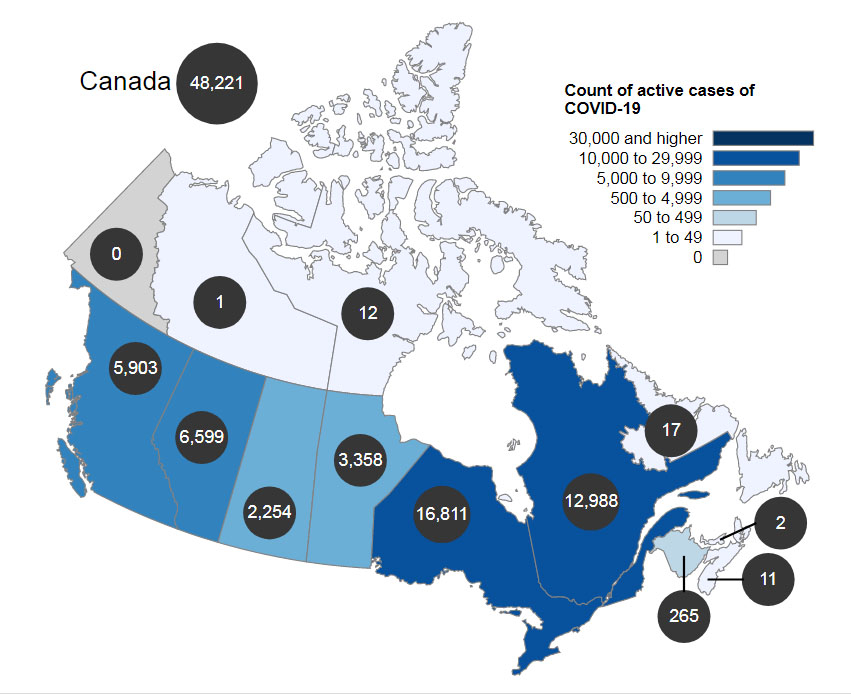
There is already talk of a third wave as coming largely due to the new variant strains of the SARS-CoV-2 virus (aka COVID-19). Viruses normally mutate, but the latest known mutations (B.117/UK, B.1351/South African) are thought to be more contagious and cause more serious illness.




